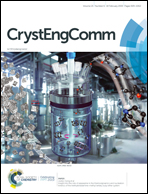Using fast scanning calorimetry to detect guest-induced polymorphism by irreversible phase transitions in the nanogram scale†
Abstract
A challenging problem in polymorph screening for compounds having a complex molecular structure and potential biological activity is the need to have them in significant amounts. In the present work, fast scanning calorimetry (FSC), which needs about 105 times less sample than conventional differential scanning calorimetry (DSC), was used in polymorph screening for a compound with irreversible melting transitions. The studied compound is a p-tert-butylthiacalix[4]arene derivative (1) with four (OCH2COGlyGlyOEt) substituents at the lower rim in a 1,3-alternate conformation. Polymorphs of 1 were prepared by its saturation in the solid state with vapors of various guests and subsequent guest removal. The thermal behavior of the polymorphs was studied by heating separate crystals or microcrystalline aggregates with rates having the order of 1000 K s−1. The results were compared with the data from DSC. The formation of new polymorphs was confirmed by powder X-ray diffraction (PXRD). The application of FSC allows the boost in the proficiency of polymorph screening for expensive and less stable substances, as well as for compounds synthesized in very small amounts.



 Please wait while we load your content...
Please wait while we load your content...